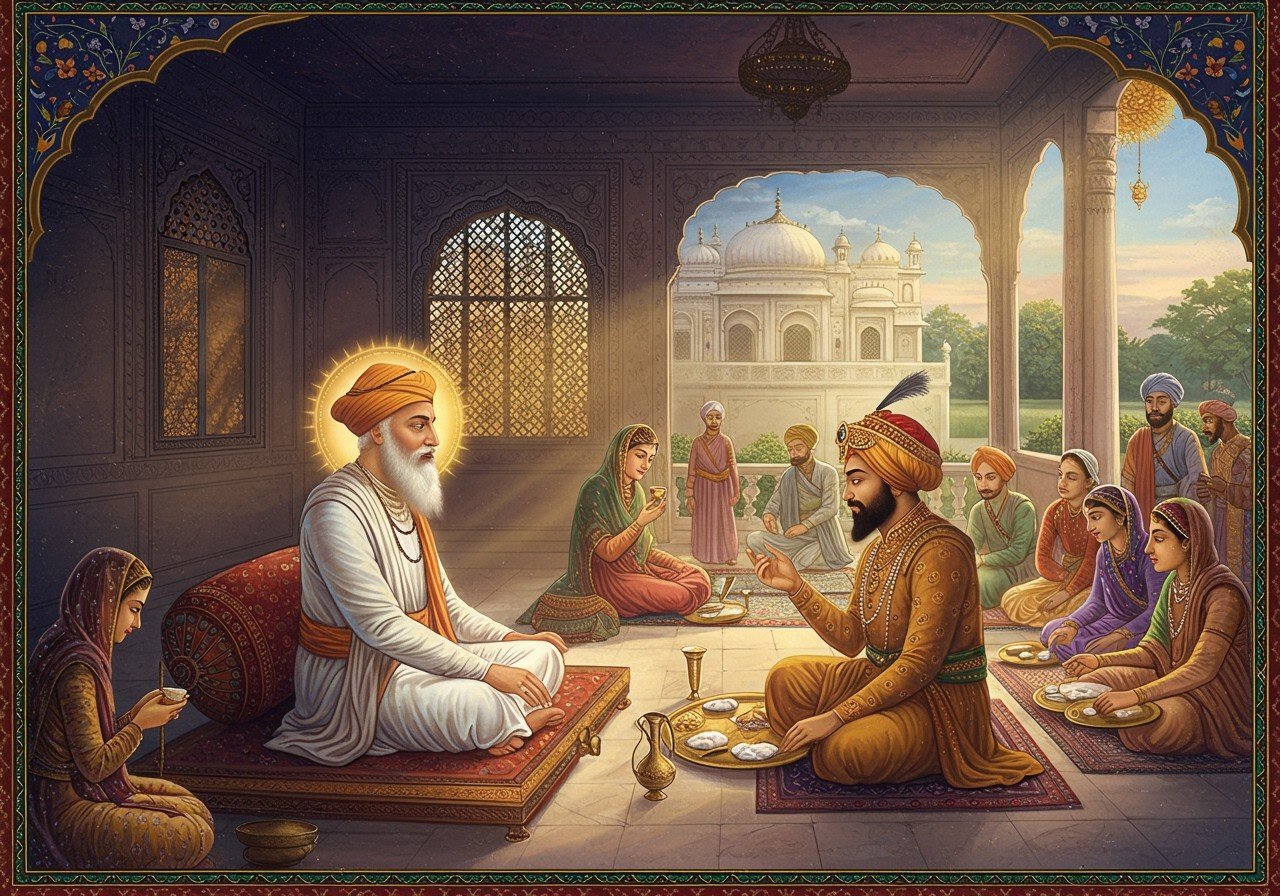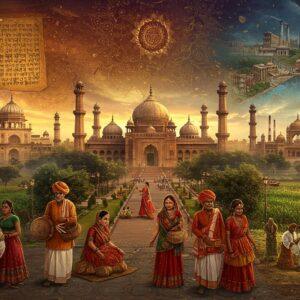
In the rich tapestry of Indian history, the meeting between Guru Amar Das Ji and Mughal Emperor Akbar stands out as a momentous occasion. This encounter, occurring in a period where religious tolerance wasn’t always the norm, is truly remarkable. Guru Amar Das Ji, the third Sikh Guru, was instrumental in spreading the teachings of Sikhism, while Akbar was renowned for his quest to understand different faiths. This meeting holds a special significance for those of us who cherish history and tradition.
The Life and Teachings of Guru Amar Das Ji
Guru Amar Das Ji’s path to becoming the third Sikh Guru is an inspiration. Born in 1479, he dedicated many years to a spiritual quest before finally encountering Guru Angad Dev Ji. Deeply impressed by his unwavering devotion, Guru Angad Dev Ji chose him as his successor.
Guru Amar Das Ji made profound contributions to the Sikh faith:
- He established the Manji and Piri systems. These organizational structures provided crucial religious and social leadership, ensuring the smooth functioning of the growing Sikh community.
- He emphasized equality and community service, or seva, as core tenets of Sikhism. These principles, coupled with unwavering devotion to God, formed the bedrock of his teachings.
- He championed women’s rights. By actively opposing practices like Sati, he demonstrated his commitment to social justice and the upliftment of women in society.
- He oversaw the construction of the Baoli at Goindwal Sahib. This sacred well became a vital pilgrimage site for Sikhs, fostering a sense of community and shared devotion. You can learn more about maintaining your personal Mandir here.
These teachings, reflecting his deep commitment to both social justice and spiritual evolution, continue to resonate with and guide countless individuals today.
Mughal Emperor Akbar: A Visionary Leader
Akbar, the Mughal Emperor, reigned from 1556 to 1605. His rule is celebrated for its groundbreaking policies of religious tolerance and inclusion. He even introduced the Din-i Ilahi, a spiritual path that sought to harmonize elements from various religions. This bold initiative demonstrated his sincere yearning for spiritual unity.
Akbar’s court was a vibrant hub of diverse cultures and faiths, fostering an atmosphere of open dialogue and exchange with spiritual leaders from various backgrounds. Akbar’s influence extended beyond the political realm, enriching the arts and culture of his time. His patronage left behind a legacy of breathtaking architecture, a testament to his vision and refined taste.
The Encounter Between Guru Amar Das Ji and Akbar
Their historic meeting unfolded in 1569 in Goindwal, Punjab. Akbar’s visit to the Guru was imbued with profound respect and a genuine curiosity to learn more about Sikhism. Before their formal meeting, Guru Amar Das Ji extended a heartfelt invitation to Akbar to partake in Langar, the community kitchen. There, Akbar sat amongst ordinary people, experiencing firsthand the Sikh principles of equality and humility.
Akbar was deeply touched by the simplicity and inclusivity of the Langar. This shared meal solidified his appreciation for the core teachings of Sikhism. While Akbar offered land to support the Langar, Guru Amar Das Ji politely declined. He emphasized the importance of self-reliance and community support, stating that the Langar should thrive on the honest earnings of the people, not royal grants. Find high-quality incense sticks and other flammables for your spiritual practice on poojn.in.
This encounter also had significant political repercussions. Guru Amar Das Ji appealed to Akbar to repeal the Jizya tax imposed on Hindus, a financial burden on many. Akbar graciously agreed, demonstrating his commitment to just and equitable governance.
Impact of the Meeting on Sikh-Mughal Relations
This meeting laid the foundation for future interactions between Sikh Gurus and Mughal rulers. Akbar’s policies of respect and understanding had a positive influence on subsequent Sikh-Mughal relations. Historical accounts suggest continued dialogue and peaceful resolutions between these communities.
The land gifted to Bibi Bhani, Guru Amar Das Ji’s daughter, by Akbar later became the site of the city of Amritsar, the spiritual home of the revered Harmandir Sahib, also known as the Golden Temple. This generous act forged a lasting bond between the Sikh community and the Mughal empire.
Cultural and Religious Significance
The meeting between Guru Amar Das Ji and Akbar beautifully exemplified the enduring values of inclusivity and open dialogue. Their interaction played a significant role in shaping the religious landscape of India, nurturing a spirit of interfaith understanding and harmony.
Even today, this historical event serves as a powerful example of peaceful coexistence and religious harmony. It reflects a legacy of mutual respect and meaningful dialogue between diverse communities, resonating with our contemporary efforts toward peace and understanding. Check out our selection of holy books to deepen your understanding of different faiths.
How Poojn.in Can Help You Honor This Historical Legacy
At Poojn.in, we offer authentic puja items that help you connect with and maintain the spiritual traditions exemplified by the historic meeting between Guru Amar Das Ji and Emperor Akbar. Our carefully curated collection includes:
- Pure Brass Karahi Set: Perfect for preparing langar prasad, allowing you to participate in the tradition of selfless service established by Guru Amar Das Ji. These sturdy and beautifully crafted sets will enhance your langar preparations. Shop now.
- Traditional Brass Thali Sets: Ideal for serving langar meals with respect and dignity. Our thali sets bring a touch of tradition and elegance to your dining experience. Explore our collection.
- Pure Cotton Prayer Mats: Essential for your personal meditation and prayer rituals, creating a peaceful and sacred space for your spiritual practice. Our comfortable and durable prayer mats support your devotion. Find your perfect mat.
- Brass Water Vessels: For offering water to devotees, upholding the timeless tradition of seva. Our beautifully designed vessels enhance the sanctity of your rituals.
Order these sacred items with ease:
- Website: www.poojn.in
- Phone: 03369029784
- WhatsApp: 9476142738
We offer:
- Pan-India delivery
- Secure packaging
- Quality assurance
- Expert guidance on product selection
- Easy online payment options
Visit Poojn.in to explore our complete range of traditional puja items that help you preserve and practice these vital spiritual traditions. Our dedicated team is always available to assist you in choosing the perfect items for your religious needs.
Conclusion
The meeting between Guru Amar Das Ji and Emperor Akbar serves as a shining testament to the transformative power of dialogue and mutual respect. Their encounter in 1569 wasn’t just a fleeting moment in history, but a timeless beacon of inclusivity and understanding. Akbar’s willingness to engage with Guru Amar Das Ji and embrace the wisdom of Sikh teachings illuminates the boundless possibilities of harmony between different faiths and cultures. For more insights into spiritual practices, visit our blog on Tulsi Peeth.
This historical event significantly shaped Sikh-Mughal relations, paving the path for peaceful coexistence and mutual regard. The profound lessons from their meeting resonate even today, encouraging communities to embrace diversity and collaborate towards a brighter future.
In a world often fragmented by differences, the inspiring narrative of Guru Amar Das Ji and Akbar reminds us of the strength we find in unity and the immeasurable value of open-hearted communication. Reflecting on their legacy provides invaluable guidance, encouraging us to cultivate peace and understanding within our own lives. Learn more about visiting spiritual sites with our guide to the Jyotiba Temple.
Guru Amar Das Ji & Akbar: FAQs
Who was Guru Amar Das Ji?
Guru Amar Das Ji was the third Guru of the Sikhs, a pivotal figure who significantly advanced the Sikh faith and introduced many important community services. His teachings continue to inspire Sikhs worldwide.
What was the historical encounter between Guru Amar Das Ji and Akbar?
Emperor Akbar visited Guru Amar Das Ji in 1569, seeking blessings and a deeper understanding of Sikh teachings. This meeting stands out for its mutual respect and open dialogue.
How did Akbar show respect to Guru Amar Das Ji?
Akbar demonstrated his respect by personally visiting Guru Amar Das Ji and humbly participating in the Langar, the communal kitchen, alongside common people. This act acknowledged the Sikh principle of equality.
Guru Amar Das was the contemporary of which Mughal ruler?
Guru Amar Das Ji was a contemporary of Akbar, the Mughal emperor renowned for his open-mindedness towards different religions and cultures. Their meeting occurred during Akbar’s reign.
What was the significance of the Langar during Akbar’s visit?
The Langar underscored the Sikh value of equality. By sharing a simple meal with common people, Akbar transcended the social barriers of caste and status. You can find beautiful decorative items for your home mandir at poojn.in.
Guru Amar Das Kis ke Samkalin the?
Guru Amar Das Ji, Akbar ke samkalin the, jo Mughal Samrat the aur jinhone Sikh dharm ke bare mein gyaan prapt kiya. Unka yeh milan bahut aham mana jata hai.
Why did Akbar visit Guru Amar Das Ji?
Akbar visited Guru Amar Das Ji to gain insights into Sikh teachings and seek blessings. This visit exemplifies his open-mindedness and respect for various faiths.
What impact did the meeting between Akbar and Guru Amar Das Ji have?
This meeting introduced Sikhism’s core values to a wider audience, particularly within the Mughal court, and fostered a stronger bond between the Mughal empire and the Sikh community. It laid the groundwork for greater religious tolerance and understanding. Discover a wide range of traditional and contemporary holy clothing at poojn.in, perfect for your spiritual practices and ceremonies.
Planning a spiritual journey? Read our Kumbh Mela Guide for valuable insights and practical tips.


